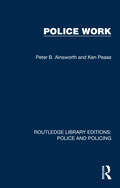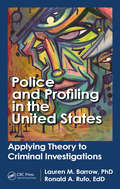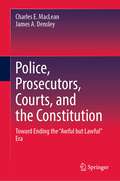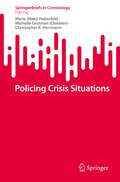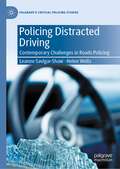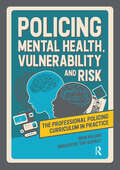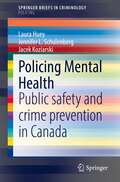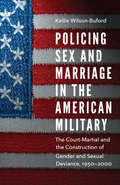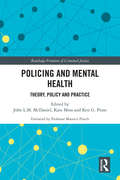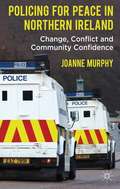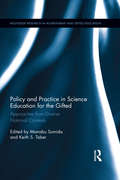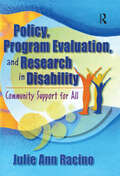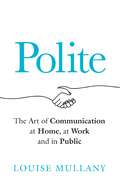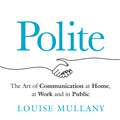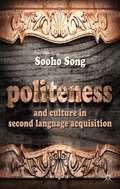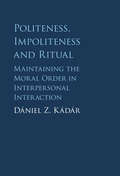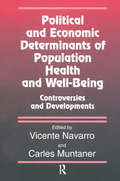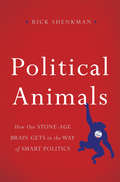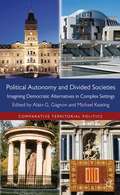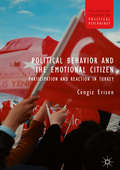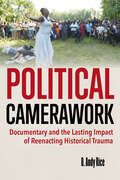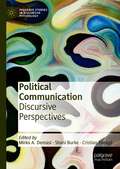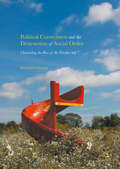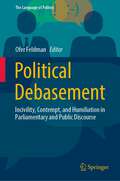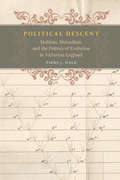- Table View
- List View
Police Work (Routledge Library Editions: Police and Policing)
by Ken Pease Peter B. AinsworthWhy don’t people rush to help at an accident? Why do eyewitnesses give different accounts of the same event? Is there such a thing as a ‘born criminal’? How can you get people to cooperate with police investigations? Can you tell if someone is lying? How can police officers reduce their own levels of stress? Originally published in 1987, these are just some of the questions that Police Work answers. Using practical, everyday examples from real life, Police Work shows serving and training police officers how a better understanding of why people do the things they do can make their own work more efficient. Without jargon or unnecessary technical language Police Work spells out the practical implications of current thinking on such topics as communication, behaviour in groups, the treatment of crime victims, crisis intervention techniques, countering prejudice and fear of crime.
Police and Profiling in the United States: Applying Theory to Criminal Investigations
by Lauren M. Barrow Ron A. Rufo Saul ArambulaTraditionally, criminal profiling texts have focused on the technicalities of conducting an investigation, but recent developments in criminal justice have encouraged greater consideration of related fields. Highlighting the current paradigm shift in criminology towards a cross-disciplinary understanding of behavior, this book enables investigators to combine theory, instinct, and hunches with contemporary technology to construct a solid criminal profile. It examines theories on criminal behavior, describes how to develop typologies based on different criminal characteristics, examines the critical role of crime scenes, and concludes with scintillating profiles of 13 of the most notorious serial killers.
Police, Prosecutors, Courts, and the Constitution: Toward Ending the “Awful but Lawful” Era
by James A. Densley Charles E. MacLeanThis book delves into a multitude of practices that, although deemed “lawful” by courts, are undeniably “awful” and unethical. From police officers employing deceit to extract confessions or consent to search, to prosecutors manipulating innocent individuals to relinquish their rights and plead guilty, to excessive force by law enforcement, these practices erode public trust in the criminal legal system and deny justice to those affected.With a critical examination of these deeply flawed tactics, this volume goes beneath the surface to explore their profound impact on the ethical standards and emotional health of justice system practitioners. It forcefully argues for a reclaiming of The Social Contract and for peace officers and prosecutors to unequivocally reject these unethical methods and recognize the urgent need for a criminal justice system that truly embodies ethics and fairness. This work equips police officers, prosecutors, judges, and legislators with invaluable research, enabling them to actively advocate for a transformed system that ethically serves justice for all in the post-George Floyd era.
Policing Crisis Situations (SpringerBriefs in Criminology)
by Christopher R. Herrmann Maria (Maki) Haberfeld Michelle Grutman (Chmelev)This brief examines proactive steps police can take to lessen the potential for disaster, improve preparedness for disasters that do occur and enhance our ability to respond to and recover from them. Featuring several countries across the globe as case studies, it illustrates the predictability of various natural and manmade disasters and the need of the local police organizations to develop contingency plans to save lives and structures. With disaster losses and the human toll reaching staggering rates, and even more destructive events projected for the future as the climate shifts, there is a need for action by police and the local communities together. This volume offers a proactive plan that needs to be put in place for future crises, based on the projected predictability of reoccurring events. The brief can serve as a template for other countries and police task forces that have and will face similar crises situations in the future.
Policing Distracted Driving: Contemporary Challenges in Roads Policing (Palgrave's Critical Policing Studies)
by Helen Wells Leanne Savigar-ShawThis book draws on original research and existing theoretical perspectives and frameworks to critically examine the role of roads policing and its place within the wider field of policing. It looks at the challenges and complexities of doing roads policing and experiencing roads policing from the perspectives of police officers and the public. It uses distracted driving, and more specifically mobile phone use, as an evidence-based case study for a common issue to examine the contribution it makes to collisions, and the challenges of policing it as a driver behaviour. It also discusses broader issues such as the role of roads policing, police legitimacy, the interpretation of law, the interpretation of risk and generating compliance with the law. It speaks to both policing scholars and practitioners, as well as policy makers and road safety organisations.
Policing Mental Health, Vulnerability and Risk (The Professional Policing Curriculum in Practice)
by Brian WilliamsPart of the Professional Policing Curriculum in Practice series, this text covers the important contemporary topic of policing those who may have poor mental health are classed as vulnerable or at risk, which runs throughout the policing curriculum.It examines how policing has evolved when dealing with vulnerable people and covers situations such as county lines, modern slavery and online bullying and harassment. It emphasises the importance of the overall police response as part of a multi-agency approach and promotes the need for individual professional curiosity from police officers. Case studies add to the rich knowledge base provided, and critical questions and examples of evidence-based practice are included to embed understanding and help cement theory. Students will develop their critical thinking abilities and gain the confidence to recognise and deal with the complex issues associated with this topic.
Policing Mental Health: Public safety and crime prevention in Canada (SpringerBriefs in Criminology)
by Laura Huey Jennifer L. Schulenberg Jacek KoziarskiThis brief addresses the question of the various ways in which mental health-related issues have become police responsibility. It provides a detailed understanding of the myriad of ways in which police are often called upon to be the primary responder to mental health-related issues, well beyond the standard media images of individuals in extreme crisis. Drawing upon the results of two separate ethnographies of police practices in Canada, this volume examines how public policing has become entangled in cases of persons with mental illness (PMI). It examines two aspects of the police role and mandate that brings police officers into contact with individuals dealing with mental health disorders: public safety, and crime prevention and response. It explores police perceptions towards the roles they play in the lives of PMI, and police demands in these types of calls for service that have transformed aspects of public policing. Appropriate for policing researchers, law enforcement and public policymakers, this book presents the argument that tackling this matter requires knowledge of police involvement in situations with PMI, as well as a set of evidence-based policy options that will not generate additional resource or other strains.
Policing Sex and Marriage in the American Military: The Court-Martial and the Construction of Gender and Sexual Deviance, 1950–2000 (Studies in War, Society, and the Military)
by Kellie Wilson-BufordThe American military’s public international strategy of Communist containment, systematic weapons build-ups, and military occupations across the globe depended heavily on its internal and often less visible strategy of controlling the lives and intimate relationships of its members. From 1950 to 2000, the military justice system, under the newly instituted Uniform Code of Military Justice, waged a legal assault against all forms of sexual deviance that supposedly threatened the moral fiber of the military community and the nation. Prosecution rates for crimes of sexual deviance more than quintupled in the last quarter of the twentieth century. Drawing on hundreds of court-martial transcripts published by the Judge Advocate General of the Armed Forces, Policing Sex and Marriage in the American Military explores the untold story of how the American military justice system policed the marital and sexual relationships of the service community in an effort to normalize heterosexual, monogamous marriage as the linchpin of the military’s social order. Almost wholly overlooked by military, social, and legal historians, these court transcripts and the stories they tell illustrate how the courts’ construction and criminalization of sexual deviance during the second half of the twentieth century was part of the military’s ongoing articulation of gender ideology. Policing Sex and Marriage in the American Military provides an unparalleled window into the historic criminalization of what were considered sexually deviant and violent acts committed by U.S. military personnel around the world from 1950 to 2000.
Policing and Mental Health: Theory, Policy and Practice (Routledge Frontiers of Criminal Justice)
by Kate Moss John L.M. McDaniel Ken G. PeaseThis book explores the relationship between policing and mental health. Police services around the world are innovating at pace in order to develop solutions to the problems presented, and popular models are being shared internationally. Nevertheless, disparities and perceptions of unfairness remain commonplace. Innovations remain poorly funded and largely unproven. Drawing together the insights of eminent academics in the UK, the US, Australia and South Africa, the edited collection evaluates the condition of mental health and policing as an interlocked policy area, uncovering and addressing a number of key issues which are shaping police responses to mental health. Due to a relative lack of academic texts pertaining to developments in England and Wales, the volume contains a distinct section on relevant policies and practices. It also includes sections on US and Australian approaches, focusing on Crisis Intervention Teams (CITs), Mental Health Intervention Teams (MHITs), stressors and innovations from Boston in the US to Queensland in Australia. Written in a clear and direct style, this book will appeal to students and scholars in policing, criminology, sociology, mental health, cultural studies, social theory and those interested in learning about the condition and trajectory of police responses to mental health. Foreword written by Professor Maurice Punch.
Policing for Peace in Northern Ireland
by Joanne MurphyThis is the first in-depth analysis of the transition from the RUC to the PSNI seen through the eyes of key figures, inside and outside the organization. It provides a fresh insight into the wider social and political context in which this change occurred and is a significant contribution to the story of the Northern Ireland peace process.
Policy and Practice in Science Education for the Gifted: Approaches from Diverse National Contexts (Routledge Research in Achievement and Gifted Education)
by Manabu Sumida Keith S TaberGifted education has come to be regarded as a key national programme in many coutnries, and gifted education in science disciplines is now being recognised to be of major importance for economic and technological development. Despite these initiatives and developments internationally, there are very few discussions on gifted education in science drawing upon practices and experiences in different national contexts. In support of an international dialogue between researchers and practitioners, often working within isolated traditions, this book offers information on key influential approaches to science education for gifted learners and surveys current policy and practice from a diverse range of educational contexts. The volume offers an informative introduction for those new to studying gifted science education, as well as supporting the development of the field by offering examples of critical thinking about key issues, and accounts of the influences at work within education systems and the practical complexities of providing science education for the gifted. The contributions draw upon a variety of research approaches to offer insights into the constraints and affordancxes of working within particular policy contexts, and the strengths and challenges inherent in different approaches to practice. Chapters include: Teaching science to the gifted in English state schools: locating a compromised 'gifted & talented' policy within its systemic context Models of education for science talented adolescents in the United States: Past, present, and likely future trends Navigating the shifting terrain between policy and practice for gifted learners in Tanzania Science education for female indigenous gifted students in the Mexican context Gifted Science Education in the Context of Japanese Standardization This book will appeal to scholars, practitioners and policy makers who are in the field of gifted science education.
Policy, Program Evaluation, and Research in Disability: Community Support for All
by Julie Ann RacinoExplore case studies from the 1980s and 1990s that highlight the progress of community programs for people with disabilities! Policy, Program Evaluation, and Research in Disability: Community Support for All is an essential research reference on how community support systems can greatly assist people with diverse disabilities to live fuller lives outside of institutions. Based on qualitative research methods, Policy, Program Evaluation, and Research in Disability reflects over a decade of technical assistance and research in state, regional, and local communities throughout the United States. Community service managers, policy makers, researchers, activists, individuals with disabilities, and their families will benefit from the numerous studies that promote a better quality of life for those living with disabilities. Structured around the support and empowerment paradigm, which strives to enhance the independence of people with disabilities, Policy, Program Evaluation, and Research in Disability offers studies that combine in-depth, qualitative research approaches for use with field practicums, research internships, and professional development. You will examine studies that cover several different types of community support systems, in the fields of mental health, mental retardation, brain injury, physical and multiple disabilities.In Policy, Program Evaluation, and Research in Disability, some of the topics you will read about include:public policies to support changes in communities and governmental programs advocating for statewide changes in housing andcommunity support programs national, regional, and local studies of organizations and innovations supporting people with disabilities working for the inclusion of individuals with disabilities in public schools and communities agencies as supporters and funders of personal choice, self-advocacy, and services to families case studies on community integration that show people with disabilities living successful lives personal assistance services as described by leading consumer experts and advocates maximizing the personal futures of people with disabilities through supported employment, housing and community living With Policy, Program Evaluation, and Research in Disability, you will gain an in-depth look at the programs and policies available to people with disabilities and the emerging trends, directions, and recommendations for these programs. An excellent guide and research tool, this book challenges you to reach to another level of advocacy and not to settle for the status quo when it comes to bringing interdependence to everyone.
Polite: The Art of Communication at Home, at Work and in Public
by Louise MullanyThe first ever mass-market book on politeness and the important role it plays in our work, relationships and lives, from professor and pioneer of Politeness Theory, Louise MullanyAre women really more polite than men?What is the best way to apologise?And when is it OK to swear?Politeness rules our day-to-day lives, whether it's speaking to colleagues about issues at work, dealing with difficult family members or wondering if you should eat the last piece of pie. For years, Professor Louise Mullany has been examining the prevalence and power of politeness in our everyday speech and actions, and discovering what this says about us.In Polite, Louise shows how the unseen science of politeness governs everything we do, from what we say to how we act, and reveals how a better understanding of the rules and norms of politeness can help us in all aspects of our work, leisure and home lives.And, in doing so, she answers the age-old question... are politeness standards really declining?
Polite: The Art of Communication at Home, at Work and in Public
by Louise MullanyThe first ever mass-market book on politeness and the important role it plays in our work, relationships and lives, from professor and pioneer of Politeness Theory, Louise Mullany'Fascinating and insightful. I'm grateful to have read it, and pleased to have learnt so much in the process. I would - politely - encourage you to do the same.' Jon McGregorAre women really more polite than men?What is the best way to apologise?And when is it OK to swear?Politeness rules our day-to-day lives, whether it's speaking to colleagues about issues at work, dealing with difficult family members or wondering if you should eat the last piece of pie. For years, Professor Louise Mullany has been examining the prevalence and power of politeness in our everyday speech and actions, and discovering what this says about us.In Polite, Louise shows how the unseen science of politeness governs everything we do, from what we say to how we act, and reveals how a better understanding of the rules and norms of politeness can help us in all aspects of our work, leisure and home lives.And, in doing so, she answers the age-old question... are politeness standards really declining?'A must-read for anyone interested in becoming a more effective communicator.' Michael Haugh, The University of Queensland
Politeness and Culture in Second Language Acquisition
by Sooho SongThis book examines the importance of politeness in pragmatic expression and communication, making a significant contribution to the debate over whether the universal politeness theory is applicable globally regardless of cultural differences.
Politeness, Impoliteness and Ritual Maintaining the Moral Order in Interpersonal Interaction.
by Dániel Z. KádárRitual is popularly associated with ceremonies, though in real life it plays a significantly more important role, reinforcing what people perceive as the appropriate moral order of things, or challenging what they perceive as the inappropriate flow of events. This book introduces the reader to how people use ritual in interpersonal interaction and the interface that exists between ritual and politeness and impoliteness. As rituals have a large impact on the life of people and communities, the way in which they use politeness and impoliteness in a ritual action significantly influences the way in which the given ritual is perceived. Politeness, Impoliteness and Ritual examines this complex relationship by setting up a multi-layered analytic model, with a multidisciplinary approach which will appeal to interaction scholars, politeness researchers, social psychologists and anthropologists, and moral psychologists. It fills an important knowledge gap and provides the first (im)politeness-focused interactional model of ritual. Provides a model that can be used to analyse a wide variety of data types Provides a multidisciplinary approach to (im)politeness and ritual, by utilising politeness research, pragmatics, cross-cultural and historical interaction research, and social psychology Provides an in-depth framework of social aggression, including phenomena that generate public attention such as bystander intervention Utilises both metapragmatic and discourse analytic research
Political And Economic Determinants of Population Health and Well-Being: Controversies and Developments (Policy, Politics, Health and Medicine Series)
by Vicente Navarro and Carles MuntanerThe field of social inequalities in health continues its vigorous growth in the early years of the 21st century. This volume, following in the footsteps of Vicente Navarro's edited collection The Political Economy of Social Inequalities, is a compilation of recent contributions to the areas of social epidemiology, health disparities, health economics, and health services research. The overarching theme is to describe and explain the evergrowing health inequalities across social class, race, and gender, as well as neighborhood, city, region, country, and continent. The approach of this book is distinctly multi-, trans-, and interdisciplinary: the fields of public health, population health, epidemiology, economics, sociology, political science, philosophy, medicine, and history are all represented here.
Political Animals: How Our Stone-age Brain Gets In The Way Of Smart Politics
by Rick ShenkmanCan a football game affect the outcome of an election? What about shark attacks? Or a drought? In a rational world the answer, of course, would be no. But as bestselling historian Rick Shenkman shows in Political Animals, our world is anything but rational. This isn’t because we aren’t smart. Instead, modern cues are setting off ancient, instinctive responses that worked to keep us safe in the Stone Age but lead us astray today. Pop culture tells us we can trust our instincts. But science is demonstrating that when it comes to politics, our Stone Age brains can malfunction and misfire. Fortunately, we can learn to override our instincts and ensure that they work in our favor. Drawing on science, politics, and history, Shenkman explores the hidden reasons behind our political choices and uncovers the invisible forces that are truly responsible for victory or defeat at the ballot box.
Political Autonomy and Divided Societies
by Michael Keating Alain-G. GagnonAn all star cast of academic experts offer an important and timely analysis of the pursuit of autonomy. They argue that it is key to move beyond the primarily normative debate about the rights or wrongs of autonomous regions on the basis of cultural concerns, instead focusing on understanding what makes autonomy function successfully.
Political Behavior and the Emotional Citizen
by Cengiz ErisenThis book studies the role of emotions, such as anger, anxiety, and enthusiasm, across various domains of political behavior in Turkey. The author considers how emotions affect evaluations of leadership performance, levels of intolerance, likelihood of following and participating in politics, perceived threats from terrorism, and electoral decisions, including vote choice. Using a nationally representative survey and experimental data, this study empirically analyses the causal associations among the primary factors explaining the Turkish electorate's political attitudes and behaviours. The book will be of particular interest to academics, university students, and policymakers seeking to learn more about contemporary Turkish politics amid the recent political and social turmoil that has affected all parts of this society.
Political Camerawork: Documentary and the Lasting Impact of Reenacting Historical Trauma
by D. Andy RiceWhat mental and physical distress do actors, camerapersons, and reporters experience when working on reenactments of traumatic moments in history? In Political Camerawork, D. Andy Rice theorizes that the intense feelings produced while creating these performed scenarios, called "simulation documentaries," connect difficult pasts to the present. Building on his background as a nonfiction film director, producer, editor, and cinematographer, Rice analyzes performance techniques to gain insight into the emotional toll of simulation documentaries, including those reliving the Vietnam War, the US military's embodied training in California during the Iraq War, and an annual quadruple lynching reenactment organized by Black civil rights activists in Georgia.Investigating the lasting impact of these productions, Political Camerawork reveals that, by performing a simulation of a traumatic event they didn't directly experience, those involved become carriers of the trauma.
Political Communication: Discursive Perspectives (Palgrave Studies in Discursive Psychology)
by Cristian Tileagă Mirko A. Demasi Shani BurkeThis book explores discursive psychological empirical research in the context of political communication. Drawing together a well-established field of study and a variety of discursive psychology approaches the authors confront the theoretical and practical challenges that discursive psychology and political communication studies face today. Using a diverse range of approaches, including the analysis of TV shows, cartoons, social media groups and blogs, face-to-face verbal interaction, political rhetoric and mainstream news reports, the authors explain the ways in which discursive psychology can offer insight into the nature of contemporary political communications. The book offers timely and international reflections on the context of online political communication, Brexit rhetoric, prejudice discourse and political persuasion, showcasing the analytical acumen and empirical insight that can be gleaned from discursive psychology methods.Political Communication: Discursive Perspectives highlights the value of contributions from outside English speaking academia and is essential reading for academics, researchers and students interested in political communication or discursive psychology.
Political Correctness and the Destruction of Social Order
by Howard S. SchwartzThis book develops a psychoanalytic theory of political correctness and the pristine self, which is defined as a self touched by nothing but love. It explores the damage that political correctness can do to social order. Applications include the breakdown of social capital, the financial crisis, and Occupy Wall Street. Long an issue for conservatives, alarm over political correctness has now spread to the liberal side of the political spectrum. As Schwartz argues, all have reason to be concerned. The psychology that underlies political correctness has the potential to be extremely destructive to social organization on every level. Schwartz discusses the primitive roots of political correctness and, through the use of case studies, shows its capacity for ruination. The book focuses on a transformation in the idea of the self, and specifically the rise of the pristine self. The problem is that, in truth, the world does not love us. This puts the pristine self at war with objective reality.
Political Debasement: Incivility, Contempt, and Humiliation in Parliamentary and Public Discourse (The Language of Politics)
by Ofer FeldmanThis edited book is an innovative collection of studies—pioneering scholarship systematically exploring the various features of debasement language used by political leaders in their speeches, statements, and remarks during parliamentary and other official as well as unofficial, private activities. The book examines in particular the forms, functions, and effects of political debasement in Western and non-Western countries, including Spain, Malaysia, the UK, Japan, China, India, Montenegro, Greece, Poland, and Israel. It addresses the growing interest in recent years in issues related to the increase of debasement in the public sphere. These include high-echelon politicians’ invective and vulgarity toward their colleagues in houses of parliament; their abusive and cynical language toward sections of the public, including women and minorities; and their crude sarcasm and irony expressed toward media representatives. The book focuses on those instances where political leaders at the very highest-level employ debasement discourse; it identifies the specific language they use in different political cultures and under different situations; the reasons for using this type of language; and its consequences. The book brings together a team of distinguished political scientists, communication and linguistics researchers, and social and political psychologists, with expert backgrounds and experience in understanding the reciprocal interaction between language and politics, in this case: debasement. They discuss and provide a number of novel insights of theoretical and practical importance regarding debasing discourse, as well as potential avenues for future research on the nature and effect of this type of language.
Political Descent: Malthus, Mutualism, and the Politics of Evolution in Victorian England
by Piers J. HaleHistorians of science have long noted the influence of the nineteenth-century political economist Thomas Robert Malthus on Charles Darwin. In a bold move, Piers J. Hale contends that this focus on Malthus and his effect on Darwin’s evolutionary thought neglects a strong anti-Malthusian tradition in English intellectual life, one that not only predated the 1859 publication of the Origin of Species but also persisted throughout the Victorian period until World War I. Political Descent reveals that two evolutionary and political traditions developed in England in the wake of the 1832 Reform Act: one Malthusian, the other decidedly anti-Malthusian and owing much to the ideas of the French naturalist Jean Baptiste Lamarck. These two traditions, Hale shows, developed in a context of mutual hostility, debate, and refutation. Participants disagreed not only about evolutionary processes but also on broader questions regarding the kind of creature our evolution had made us and in what kind of society we ought therefore to live. Significantly, and in spite of Darwin’s acknowledgement that natural selection was "the doctrine of Malthus, applied to the whole animal and vegetable kingdoms,” both sides of the debate claimed to be the more correctly "Darwinian. ” By exploring the full spectrum of scientific and political issues at stake, Political Descent offers a novel approach to the relationship between evolution and political thought in the Victorian and Edwardian eras.
